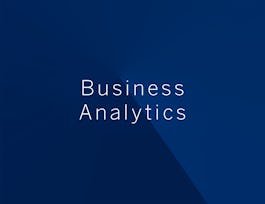This is the second course in the Google Data Analytics Certificate. You’ll build on your understanding of the topics that were introduced in the first course of this certificate program. The material will help you learn how to ask effective questions, make data-driven decisions, and meet stakeholders’ needs. Current Google data analysts will instruct and provide you with hands-on ways to accomplish common data analytics tasks.



Ask Questions to Make Data-Driven Decisions
This course is part of Google Data Analytics Professional Certificate

Instructor: Google Career Certificates
Top Instructor
Sponsored by Mojatu Foundation
1,167,720 already enrolled
(32,702 reviews)
Recommended experience
What you'll learn
Explain how the problem-solving road map applies to typical analysis scenarios.
Discuss the use of data in the decision-making process.
Demonstrate the use of spreadsheets to complete basic tasks of the data analyst including entering and organizing data.
Describe the key ideas associated with structured thinking.
Skills you'll gain
Details to know

Add to your LinkedIn profile
22 quizzes, 2 assignments
See how employees at top companies are mastering in-demand skills

Build your Data Analysis expertise
- Learn new concepts from industry experts
- Gain a foundational understanding of a subject or tool
- Develop job-relevant skills with hands-on projects
- Earn a shareable career certificate from Google


Earn a career certificate
Add this credential to your LinkedIn profile, resume, or CV
Share it on social media and in your performance review

There are 4 modules in this course
Data analysts are constantly asking questions in order to find solutions and identify business potential. In this part of the course, you’ll learn about effective questioning techniques that will help guide your analysis.
What's included
8 videos7 readings5 quizzes1 assignment2 plugins
In analytics, data drives decision-making, and this is your opportunity to explore data of all kinds and its impact on all sorts of business decisions. You’ll also learn how to effectively share your data through reports and dashboards.
What's included
6 videos6 readings5 quizzes
Spreadsheets are a key data analytics tool. Here you’ll learn both why and how data analysts use spreadsheets in their work. You’ll also investigate how structured thinking helps analysts understand problems and come up with solutions.
What's included
9 videos10 readings10 quizzes1 plugin
Successful data analysts balance the needs and expectations of their team and the stakeholders they support. In this part of the course, you’ll learn strategies for managing stakeholder expectations while establishing clear communication with your team.
What's included
14 videos8 readings2 quizzes1 assignment1 plugin
Instructor

Offered by
Why people choose Coursera for their career




Learner reviews
32,702 reviews
- 5 stars
79.58%
- 4 stars
16.06%
- 3 stars
2.97%
- 2 stars
0.70%
- 1 star
0.67%
Showing 3 of 32702
Reviewed on Aug 29, 2021
It was a good course, I didnt know anything related to data analysis, and since I started these courses I've been able build up my skills, mind you I've haven't put it into practice in reality yet.
Reviewed on May 12, 2024
Everything was perfect but some questions on the practice and graded quizzes were tricky. The answers conflicted from the point of view side so it might need a better explanation for the right answer.
Reviewed on Mar 27, 2021
I feel like this course was rather lackluster and only reinforces basics that most professionals and/or fresh graduates are already aware of. Regardless, it was a good refresher and quick paced.
Recommended if you're interested in Data Science

Campus BBVA

University at Buffalo

Open new doors with Coursera Plus
Unlimited access to 10,000+ world-class courses, hands-on projects, and job-ready certificate programs - all included in your subscription
Advance your career with an online degree
Earn a degree from world-class universities - 100% online
Join over 3,400 global companies that choose Coursera for Business
Upskill your employees to excel in the digital economy




